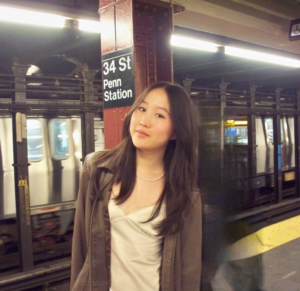Danica Sun is a senior at Illinois Math and Science Academy. She is co-head of Fridays for Future Chicago, which she leads with fellow IOF student, Natasha Bhatia. They met in the IOF program.
Tell a story about an experience that made you aware of climate change/inspired you to be a part of climate activism.
My climate journey began when I saw the image of a polar bear mother floating away from her cub, stranded on a chunk of ice. Driven to act, I signed petitions on change.org. I embarked down a rabbit hole of strung-together-Google-searches that ultimately left me with more questions than answers. When I learned about the rapidly melting permafrost releasing gigatons of carbon, methane, and long-dormant diseases into the atmosphere, I realized petitions would not stop the permafrost from melting. I had to do more.

I devoured reports from the Intergovernmental Panel on Climate Change and swore off fast fashion. I even gave up my favorite steaks and became vegan—though it took a 60-slide presentation to convince my traditional, meat-loving parents. The more I learned, the more I knew that I was not going to solve the climate crisis alone. My ideas, I discovered, are only as powerful as my ability to influence others to change.
What is your experience of climate change?
Climate change impacts almost every decision I make; from what I eat for breakfast (vegan sausages) to what classes I choose in school (environmental chemistry & political theory) to how I spend my precious free time (research on Wednesdays & strikes on the weekends with strangers twice as old as me). It is always on my mind, but instead of allowing myself to become consumed with climate anxiety, I channel this worry into activism.
What was a time you had to be resilient in climate change work?
The biggest mountain to climb in the face of climate change is indifference, or worse, pessimism. 6 in 10 youth are “very or extremely worried about climate change,” and 49% say this negatively impacts their daily lives. My own eco-club co-president confessed to me last week, “I don’t know if climate change will ever be solved; we’ll all just suffer and die.”
Creativity is the antidote to this kind of thinking: catching the attention of the indifferent and breaking through the hard shell of the pessimistic. I draw on my creativity to motivate people with a climate parody to the song “Radioactive” by Imagine Dragons rather than scientific models that look like The Day After Tomorrow; people shut down in the face of such horrendous realities. To overcome unprecedented climate consequences, scientists, engineers, and entrepreneurs need creativity to create and implement solutions. Creativity motivates, communicates, and innovates.
What does a better world look like to you?
A better world would be one filled with intergenerational, interfaith, and international unity.
How does going to COP play a role in your climate activism journey?
Just like the IOF representatives from past years, I hope to personally interact with officials and adults in power, and express the urgency and magnitude of the climate crisis and the relevancy to them and their children. Along with meeting those in power, I also hope to interact with those like me – fighting for climate action.
In my journey, COP28 marks my entrance into climate activism on a global scale. I am very eager to meet, learn from, and influence leaders from all over the world. Going to COP28 is an amazing opportunity that not many people get to have, so I will maximize my time there and ensure I use my voice to amplify the voices of those not given the opportunity to attend.
What do you hope to gain from attending COP?
I am interested in going to COP28 to have the opportunity to actively interact with the decision makers in power and others like me fighting for our futures. I hope to gain a more global perspective and am really eager to learn about various topics from people of many different backgrounds.
I am constantly empowered by the climate movement and hope that through sharing my work I can lead by example to guide and inspire those new or shy to the climate movement. I also hope to take everything I would learn at COP28 and use my platform to amplify the voices speaking there, bringing them back to my community and networks.
What do you want world leaders to know?
As a teenager, it should not solely be my generation’s job to ensure we have a safe and sustainable future. We should not feel the need to sacrifice things such as our education, diets, and high-school years to ensure we and those around us have a livable Earth. Yes, I love the work I do in climate action, but in the end it should not be something that my generation is constantly worrying about and working on.
What do you want adults and decision makers in your community to know? How about your peers?
I am a climate activist because climate change is THE crisis of the century. What we do now directly determines not only my future, but also the future of the next generations. This past summer, when I felt the record-breaking heat, smelled the Canadian smoke drifting across North America, and saw the “once in a century” tornadoes and hurricanes making news headlines, I saw a glimpse into my future.
How could I face my children in 30 years and tell them I did not do everything I could to ensure they have a safe world to grow up in? If I do not act, if my generation does not fight for ourselves and for the children of tomorrow, who will?
